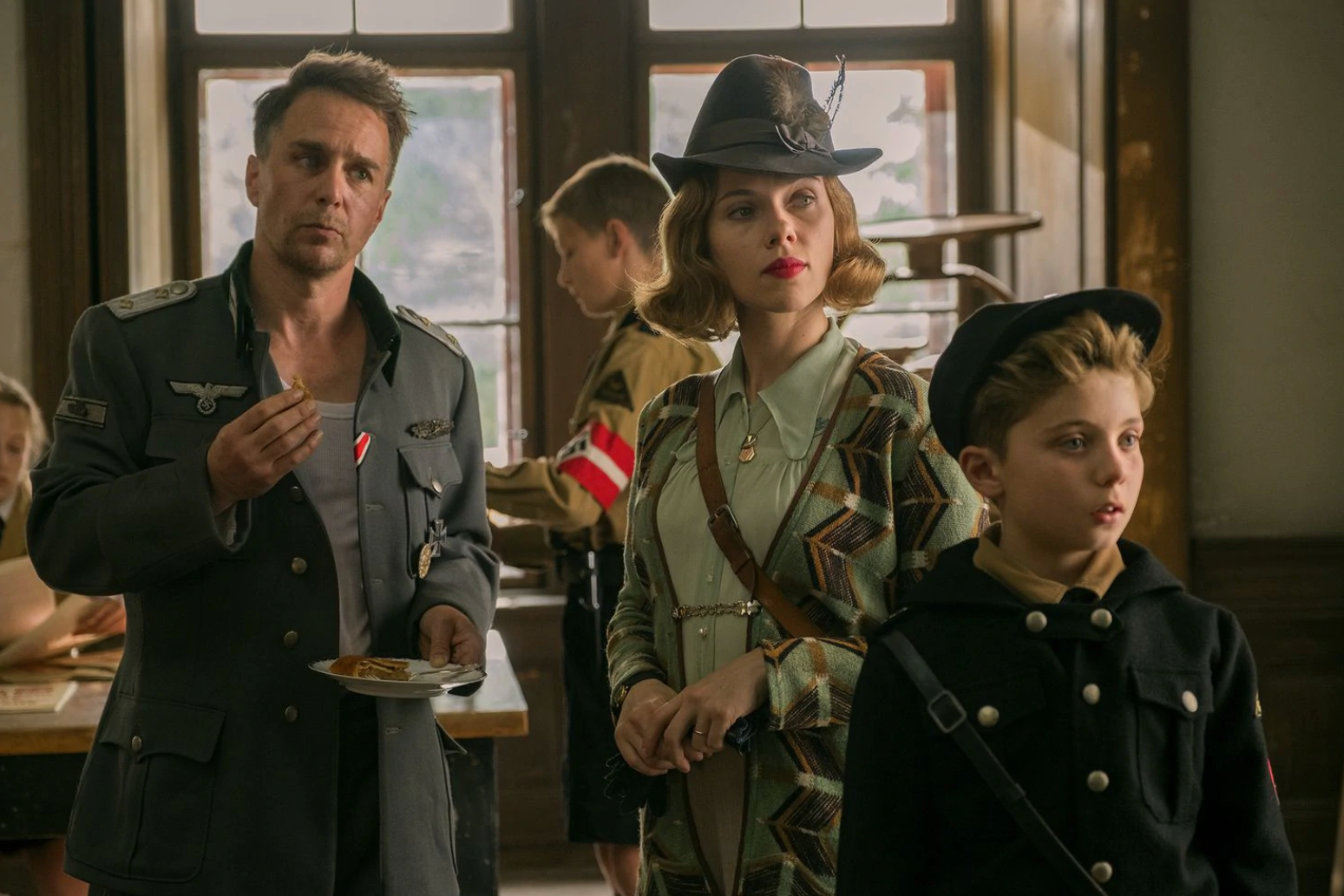“You’re not a Nazi, Jojo. You’re a ten year-old kid who likes dressing up in a funny uniform and wants to be part of a club.”
– Jojo Rabbit
“Love is the strongest thing in the world.”
“I think you’ll find that *metal* is the strongest thing in the world, followed closely by dynamite, and then muscles.”
– Jojo Rabbit
You know it’s a good movie when you clap spontaneously, laugh like a maniac, and feel your heart torn to shreds in the same two-hour stretch.
Jojo Rabbit is that movie.
Saw it last night and have a lot to say about it. If you haven’t seen this wonderful movie, stop reading, watch the trailer, and get your tix. If you have seen it and want to discuss, keep reading.
—————–
SPOILERS BELOW
—————–
This is a movie about the choices between authentic living and belonging and the false kinds of life and belonging offered in conformity to the mass. In this case, that mass is totalitarian Nazi Germany’s obedience and death cult.
The Default: Belonging to the Mad Collective
The movie starts with young Johannes (Jojo) heading off to summer camp to “become a man,” (despite not being able to tie his own shoes) sprinting away to the delightful tunes of The Beatles “I Wanna Hold Your Hand” in German.
Turns out summer camp is more like a Hitler Youth training camp for 10 year-old soldiers. The sad (and hilarious) absurdity of the Nazi’s doomed experiment is quickly apparent, even though Jojo tries to go along with it all.
But he refuses to do one thing: when ordered to kill a defenseless rabbit, he refuses. That earns him the nickname “Jojo Rabbit” from the older Hitler Youth bullies in one of the first scenes of overt monstrousness. In an attempt to strike back, Jojo decides to double down on the “brave Nazi warrior” thing and wounds himself with a grenade.
We see that Jojo is evidently different. He is gentle. He is sincere (if sincerely brainwashed). And he isn’t exactly fitting in – he has precisely one real friend.
Did I mention his other friend is an imaginary version of Adolf Hitler?
Jojo heads into this story longing for acceptance and belonging in the suicidal death cult that is his culture. It’s hard to imagine that so many other kids shared the same backdrop for growing up, but that’s why this film is so important.
The Choice
We soon learn about one big reason for Jojo’s decent heart.
His mother Rosie (played by Scarlett Johansson) is a woman of kindness, independence, ferocity, humor, and imagination. In other words, she is everything the Nazis are not. Humor and imagination are bulwarks against tyranny in Rosie’s home, and her playful, loving interactions with Jojo are some of the most touching moments in the film.
We also learn that Rosie is part of the German resistance, and (much to Jojo’s horror) she is hiding a young Jewish girl in Jojo’s deceased sister’s bedroom.
Determined to write a book on Jewish people (all the better to defeat them, to his mind) Jojo begins to get to know the young woman, whose name is Elsa. Terror turns into curiosity, curiosity turns into tolerance, and tolerance turns into friendship – and later a serious crush.
As Germany falls apart in the latter days of the war, Jojo experiences a central transformation: from imaginary friendship (with Hitler) to his true friendship with Elsa. He finds true belonging in a human relationship with an unconquered individual with a rich inner life. At the same time, the false sense of belonging in the world of Nazi-dom loses its luster.
Then Rosie is hung for her participation in the resistance, and the Nazi dream (nightmare, rather) of Germany is falling apart all around Jojo’s ears. Kids, civilians, and old German shepherds (actual shepherds, not dogs) are conscripted to defend the city in a last desperate fight. Little boys who stayed in the “club” of the Hitler Youth are used as cannon fodder – a horrifying look at where inauthentic “belonging” ends up.
Authentic Living and Belonging
When the dust settles, Jojo and Rosie have each other. And though Jojo is afraid, he makes the decision to set Rosie free.
Before he does so, a brain-spattered Hitler – once his imaginary friend – warns him that unless he chooses the totalitarian way, he will end up in a “desert of insignificance.” It’s notable how the affable and goofy Hitler of Jojo’s earlier imagination has become something truly worthy of hatred and resistance.
Jojo responds appropriately: he kicks imaginary Hitler out the window with a well-placed foot to Nazi nuts.
In a perfect closing of a loop, he ties one of Elsa’s shoes for her as she prepares to step outside.
And then they dance.
Jojo goes from being his society’s false idea of “being a man” to “doing what he can” (as good a definition of true manhood as any). Elsa, who had a childhood denied to her, found her imaginative inner life in Jojo and now takes a step into free womanhood in the outside world.
But more importantly, both found what it meant to live authentically and to belong authentically.
This movie shows life’s resilience and beauty despite tremendous evil. Rosie knew that:
“As long as there’s someone alive somewhere then they lose.”
When evil seems most powerful, we all have to remember to keep our inner lives alive, as Rosie did, as Elsa did, and as Jojo did.




